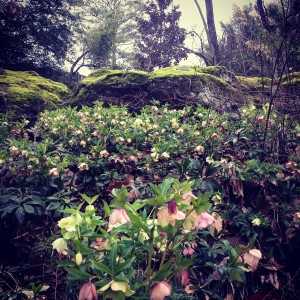
Lenten Roses blooming below the rocks….
After this winter’s double polar vortex whammy, I’ve been a little unsure what to expect in the garden. Is the confederate jasmine alive? I scratch its bark; it’s green near the bottom of the vine so I’ll need to cut it back to live wood. Will the black elephant ears that are in the water down by the rock outcrop come up this year? No sign yet but I’m still hopeful. They’ve been there for 8 years at least!
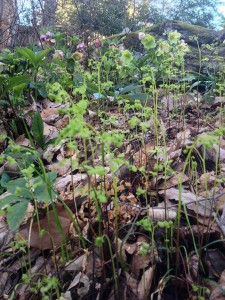
Southern maidenhair fern waking up…
And what about the salvias? My Mexican Sage is definitely gone, but I see tiny green leaves on the blue Salvia ‘Indigo Spires’. The forsythia sage looks like it is reappearing too. That is a huge surprise.
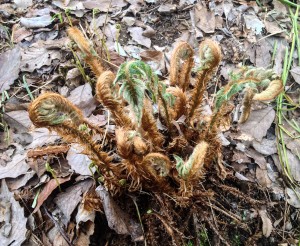
Tassel Fern croziers beginning to unfurl…
As I walk, I see the ferns are finally beginning to awaken, and, amid the blooming lenten roses, the southern maidenhair fern is finally up and beginning to unfurl dainty spring green fronds.
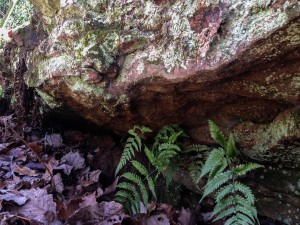
Japanese painted fern…
The holly ferns took a big hit; I’ve cut them back completely. Some are showing signs of life, others aren’t. I see it’s going to be a waiting game. Last season’s winter-tattered tassel fern fronds are laying flat on the ground, and I cut them back. The new, coppery-colored croziers will unfurl more each day, reaching for the light. The garden is coming back to life!
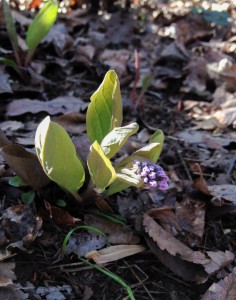
Virginia bluebells…
I’ve wondered if the Japanese painted ferns would make it. Perhaps I worry too much, because now I see a single frond, and then more. They blend into the rock behind them, but I know where to search. I’m so happy to see them. There should be more soon if the changeable March weather doesn’t turn fickle on me.
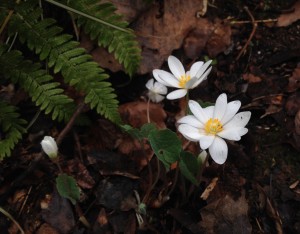
Bloodroot…
Every day I walk through the garden, searching for more – the native wildflowers with names like rue anemone, virginia bluebells, crinkle root, trillium, jacob’s ladder, bloodroot, hepatica, blue woodland phlox. These are the tiny ones, the spring ephemerals that somehow know to begin growing with longer, warmer days.
Soon I’ll begin to look up in the garden as well. The buds of the viburnums are getting larger, and the spiraeas are beginning to bloom. I know more and more will vie for my attention. For now, though, I’ll continue to look down, searching for spring.
Spring is coming to the nursery too! If you’re looking for treasures for your garden or just enjoy stopping by, come in to see our beautiful selection of shrubs, perennials, native plants and more. It’s a feast for the senses!
Below are the latin names for plants mentioned in this post:
Confederate jasmine – Trachelospermum jasminoides; Black Elephant Ears – Colocasia sp. Mexican Sage – Salvia leucantha; Indigo Spires Salvia – Salvia x ‘Indigo Spires’ ; Forsythia Sage – Salvia madrensis; Lenten Rose – Helleborus orientalis; Southern Maidenhair Fern – Adiantum cappilaris; Holly Fern – Cyrtomium falcatum; Tassel Fern – Polystichum polyblepharum; Japanese Painted Fern – Athyrium niponicum; Virginia Bluebells – Mertensia virginica; Blue Woodland Phlox – Phlox divaricata; Jacob’s Ladder – Polemonium reptans; Crinkle Root – Cardamine diphylla; Rue Anemone – Thalictrum thalictroides; Bloodroot – Sanguinaria canadensis.
